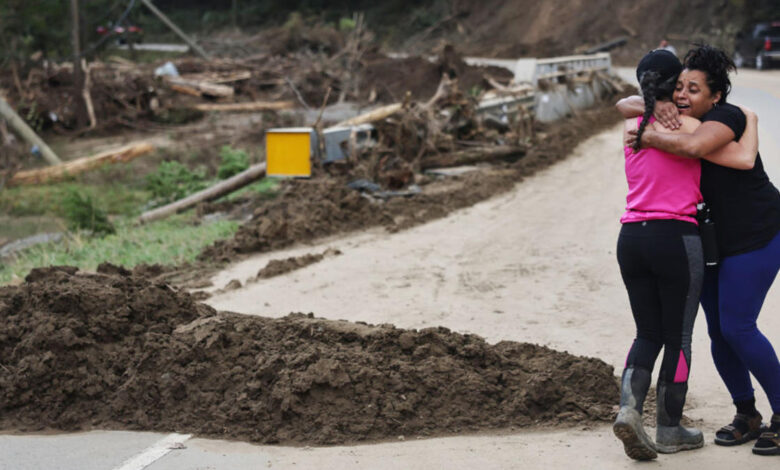After Hurricane Helene: Asheville Residents Share Stories of Resilience and Recovery.

In the pre-dawn hours of despair, Mark Starling, the indefatigable morning show maestro and news director for iHeart Media-Asheville, flicked on the mic at 3:30 a.m. His mission: to soothe and inform the shaken populace of Asheville in the wake of the cataclysm wrought by Hurricane Helene. A hurricane that swept through with such ferocity that the very fabric of this western North Carolina city was torn asunder. Starling himself, a resident intimately acquainted with the fallout, struggles under the weight of his sorrow—his neighbors, those familiar faces, have become ghosts.
“Some of our neighbors—their homes didn’t survive, nor did they,” he recounted to Yahoo Life, his voice heavy with grief. “People were literally swept away.” The chaos struck close to home; his wife, son, and four beloved dogs found themselves embroiled in a raging flood, seeking refuge at a gas station. “I lost contact with them,” he explained, relief washing over him when he finally learned they were safe. “We are incredibly fortunate—all of us escaped unscathed,” he uttered, yet with an echo of uncertainty about returning to their home without power or water.
Through sleepless nights at the station, Starling and his crew grapple with primitive conditions, devoid of running water or showers, as portable toilets become their makeshift solution. Generators hum to life, and a Starlink unit pulses with hope, while the hum of a ham radio serves as a lifeline in the muck of infrastructural failure. “This is home. These are our neighbors. These are our family members,” he poignantly states, punctuating the sentiment with the urgency of gratitude: “It’s time to pay them back.” However, even steadfast Starling finds himself ensnared in the web of grief. “I keep repeating to myself, ‘It’s OK to not be OK,’” he confesses, alongside his mantra, “Don’t get bitter, get better,” a phrase that has been his guiding light through decades of turmoil.
The monsoon-like deluge—almost 14 inches in three days—transformed Asheville into a tableau of ruin, equivalent to the rainfall expected over three months. Local officials label the aftermath as “biblical devastation,” as the storm claimed the lives of more than 200 souls across states blanketed by the disaster, leaving hundreds more unaccounted for.
In the shadows of ruin, solidarity blooms. “We’re leaning on each other, and we’re loving on each other as much as we can,” Starling remarks, sharing tales of volunteers who have transported sustenance to the radio station, and how the furry companions brought to work serve as a balm for frayed nerves. While countless residents wade through the debris of their obliterated lives, the collective essence of community stands resilient, hope flickering like a candle in the tempest. “We have hundreds of thousands facing unimaginable crises. They’ve lost everything,” Starling reflects solemnly.
Amidst the cacophony of uncertainty, Asheville residents vocalize the anguish of destruction, intertwining fear for an uncertain future with a collective call for unity. “A tragedy assists in weaving a tighter community,” asserts Thea Gallagher, a clinical assistant professor at NYU Langone Health and co-host of the Mind in View podcast. “It also aids in restoring a sense of control over the uncontrollable.”
‘At some point, we’ll sit down and think about what it means to have lost our livelihood and belongings’
René Treece, an intrepid photographer residing in Asheville, reports from the River Arts District, where monumental flooding wreaked havoc. “The building’s lower floor is now sideways,” she exclaims, her disbelief palpable. “I think the building is condemned.” When quizzed about her mental disposition, Treece admits, “I can’t tell,” instead launching into the narrative of life’s pressing needs. With cash gifts from family and friends, she stealthily aids her community, distributing funds to those struggling with scant grocery supplies. “If I see a cart with only three or four items, I surreptitiously hand over $50 or $100,” she reveals, noting the local store is cash-only amid the chaos.
“Mentally, I’m in ‘go’ mode, focused on helping others,” Treece confesses, battling her own emotional undertow. Her boyfriend, whose belongings languish beneath a foot of mud, is also laboring to assist recovery efforts. “Many are being pulled from the mire—some alive,” she shares. “So, the fate of a photography studio or furniture pales in comparison right now.” As she channels her energy to aid, Treece knows hard conversations loom ahead. “We’ll reflect on what it means to have lost our livelihoods and homes,” she states, aware that reality will soon press in heavy. “For now, it’s merely a distraction, but eventually, it will become paramount.”
‘We’re confronting all of these things that we have no idea how to handle’
Jessica Wakeman, a freelance journalist with roots deep in Asheville, relates, “We have electricity, but both water and internet are MIA.” She describes her adaptation, operating from public libraries, hauling buckets of water for daily needs. “I’m perched atop a steep hill—miraculously spared damage, while others below drowned.” She recaps the aftermath: “It’s just now sinking in. The emotional toll is immense.” Vexation ripples through the town, yet an undercurrent of gratitude persists—freedom from physical harm.
“The shockwaves of anxiety and sorrow present themselves like tidal waves,” she describes. “We’re navigating uncharted waters, groping for stability.” Yet small flickers of humanity pierce through the haze. “Sharing meals or petting a neighbor’s dog sparks a sense of community,” she notes. “I’ve met more neighbors amid the wreckage—people generously extend food, water, and toilet paper.” With a heart full of conviction, Wakeman asserts her family’s commitment to Asheville. “We’re not leaving,” she concludes, resolute. “I’ll drive an hour for a laundromat over abandoning my beloved hometown. And when this is cleaned up? We’ll need visitors. So come, and spend some money here.”
‘You need something, there are 10 people that will try to help you’
Brandegee Pierce and Danielle Del Sordo, the visionary duo behind Pirani, a sustainable party goods venture in Asheville, recount their harrowing experience. “We consider ourselves extremely fortunate—our basement flooded, the yard drowned, yet we have a roof over our heads,” Pierce recounts with a mix of relief and disbelief. “Words elude me when I think of the loss—to see years of hard work evaporate like mist in the wind.”
Yet a glimmer of hope shines through as Pierce lauds the community’s resilience. “Asheville has always been a remarkable place, and the way everyone has rallied together in despair is profoundly heartwarming,” he states. He reflects on the “honeymoon phase” in the wake of the storm, where the true scale of destruction took time to surface amid the haze of shattered communication. “We left for Atlanta to keep our business afloat, but guilt gnaws at me—I feel like I’ve abandoned my community,” Pierce sighs, confronting the harsh reality of a ravaged home that is no longer recognizable.
Responding responsibly, the community has sprung into action, forming groups to share resources, food, and support. “You need something, and ten neighbors leap to your aid,” he notes. “People generously offer their homes as safe havens. Humanity shines brightly when tested.”
‘We will dig out and come back stronger than ever. We have no choice’
In the very heart of it all, Eddie Foxx, the native son hosting The Eddie Foxx Show on 97.9 iHeart Radio, watches with a heavy heart. He recounts the uncertainty, “We’ve been without power since Friday, but are fortunate considering the immense grief others bear.” He, too, underestimated the storm. “A power loss? Not on our watch—yet here we are, grappling with reality.”
Driving into the city, he was met with devastation that left him breathless. “Upside-down vans, debris strewn about like a child’s forgotten toys—each mile deeper into the city confirmed our worst fears. My wife and I just cried.” Foxx, recounting the surreal experience, acknowledges the strength of his community. “In moments of crisis, we become givers, always ready to lend a hand,” he says of the mountain folk’s intrinsic spirit. “Even before the mud settled, neighbors were asking how they could help without knowing the fate of their own families. That’s who we are.”
“Recovery is our sole focus,” Foxx states resolutely. “We will excavate our lives from the detritus and emerge more robust than ever. There’s no choice in that matter.”
This article features affiliate links; clicking one may yield a commission should a purchase ensue.




